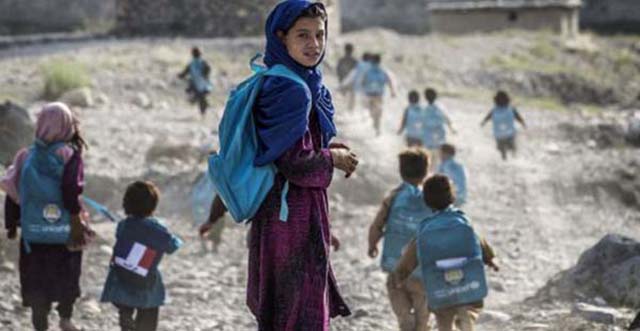Children are susceptible to social, political and economic challenges all around the world. Their life is replete with pain and sufferings. They are left at the mercy of child labor, sexual abuse and war and violence. The terrorist networks involve the children in armed conflicts and use them as human shields. Their rights and liberty are violated in the worst possible way, mainly in war-torn countries. An estimated 25 million children are uprooted from their homes; they make up nearly half of the refugee population worldwide. Moreover, there are approximately 150 million street children worldwide between the ages of 3 and 18, which include 40 per cent of homeless children.
Decades of war and conflict, drought, other natural disasters and destruction of infrastructures created widespread poverty among millions of Afghans especially in the rural areas. Child labor is one of the serious challenges in Afghanistan. With the approach of winter, the number of children increases on Kabul streets. Male and female children are involved in selling plastics, polishing shoes, etc. It is believed that a number of children from poor families will take the desire of going to school to the grave with them.
It is said that the escalated militancy, criminal activity and general insecurity affect education, with school closures reported in eastern and northern regions. Children continue to be the victims of grave violations by warring parties, including death, amputation and recruitment into armed groups.
According to UNOCHA, some 189,000 under five child deaths in Afghanistan are most likely attributable to malnutrition. Malnutrition is not only an illness that risks the life of a child, but it is also a problem that impacts the children’s future.
After all, Fifty-seven percent of all marriages that take place in Afghanistan are classified as child marriages by UNIFEM (under the legal age of 16), and 70 to 80 percent of these as forced marriages. These practices underlie many of the problems faced by women and girls, with a correlation between domestic violence and child/forced marriage. Early marriages often contribute to girls dropping out of school and to early childbearing, with the attendant risks of health complications or maternal death.
Moreover, opium and heroin addiction is one of the challenges which have affected the children too. People in Afghanistan are using opium to block pain. The pain of hunger, sickness, physical and mental trauma forced them to resort to addictions so as to alleviate their challenges for some days. There are now around 3 million addicts in this nation of about 30 million people, including tens of thousands of children.
Reportedly, as violence continues to escalate, nearly 500,000 children now live in 16 besieged areas in Syria. The number of children living under siege has doubled in less than one year and the children were almost completely cut off from sustained humanitarian aid and basic services. “For millions of human beings in Syria, life has become an endless nightmare – in particular for the hundreds of thousands of children living under siege. Children are being killed and injured, too afraid to go to school or even play, surviving with little food and hardly any medicine,” UNICEF executive director Anthony Lake is cited as saying.
The war victims who take refuge, along with their children, to foreign countries to breathe in a climate void of violence and bloodshed and flee the IS’s murderous acts and toxic ideology, succumb to death on a large scale. The children, especially the female teens, bear the brunt of war in Middle East. As a result, a considerable number of underage females fell victim to systematic rape perpetrated by IS group. Hence, it is not only the issue of education but they suffer manifold problems created by radical elements.
International humanitarian law, or the laws of war, prohibits the recruitment or use of children under 15 by parties to a conflict. “Conscripting or enlisting children under the age of fifteen years into armed forces or groups or using them to participate actively in hostilities” is a war crime under the Rome Statute of the International Criminal Court (ICC), to which Afghanistan belongs. Those who commit, order, assist, or have command responsibility for war crimes are subject to prosecution by the ICC or national courts.
The international community has to uphold children’s rights and dignity and empower them through schooling. In another item, the terrible effects of war and persisting challenges of refugees and war victims will have to be mitigated via global campaign against extremism and providing education for teenage asylum seekers. After all, the perpetrators of war crimes and violators of child’s rights have to be pursued and prosecuted in the first instance.
In Afghanistan, the government is responsible to protect the rights of the children. To advocate their rights, the state will have to conduct awareness programs to illustrate their rights on the basis of national and international laws. Moreover, it will have to provide children with educational facilities so that they can attend schools. In addition, the Ulema Council and the clergy will have to explain the rights of children based on religious tenets and Islamic Sharia and condemn the acts of the Taliban for killing and involving them in war and violence so as to mitigate violence against them.
Home » Opinion » Children’s Vulnerability to Social and Political Challenges
Children’s Vulnerability to Social and Political Challenges
| Hujjatullah Zia

